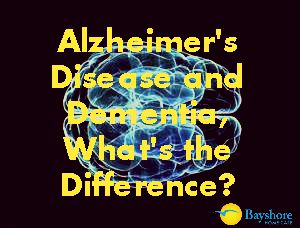As you care for your aging parents or other aging loved ones, you may find that they encounter memory issues. Senior’s memory can be impaired in many different ways from normal forgetfulness associated with aging, to various forms of Alzheimer’s and Dementia. In senior care questions often arise about what the differences are between Alzheimer’s disease and Dementia. This blog post will give you a more clear understanding about the differences so you can give your aging loved ones the best care possible.
According to the Mayo Clinic, Dementia is a “set of symptoms, not the disease itself. These symptoms might include language difficulty, loss of recent memory or poor judgment. In other words, when an individual is said to have dementia they are exhibiting certain symptoms. With a thorough screening including blood tests (to rule out other causes of dementia such as vitamin deficiency), a mental status evaluation, neuropsychological testing, and sometimes a brain scan, doctors can accurately diagnose the cause of the dementia symptoms in 90 percent of the cases.” (source)
Alzheimer’s disease is a progressive disease that destroys memory and other important mental functions. In Alzheimer’s disease, the brain cells themselves degenerate and die, causing a steady decline in memory and mental function. The first symptom usually noted with the onset of Alzheimer’s is trouble retaining information that has been newly learned. As the disease progresses people suffering from Alzheimer’s disease usually experience confusion, disorientation, changed in behavior, and difficulty with speech and walking.
For more specific information about what you can expect when your aging loved one has been diagnosed with Dementia or Alzheimer’s speak with your healthcare professional.
http://www.alz.org/alzheimers_disease_what_is_alzheimers.asp

